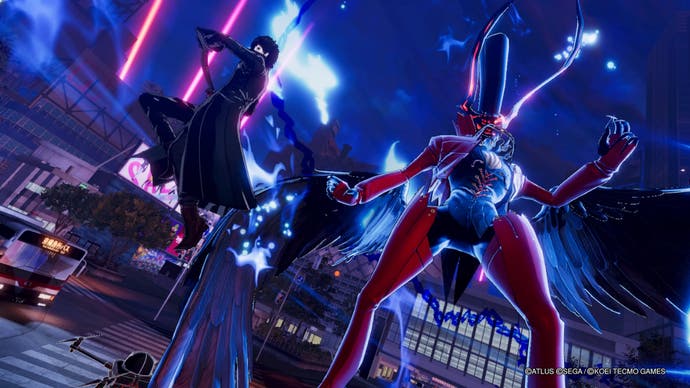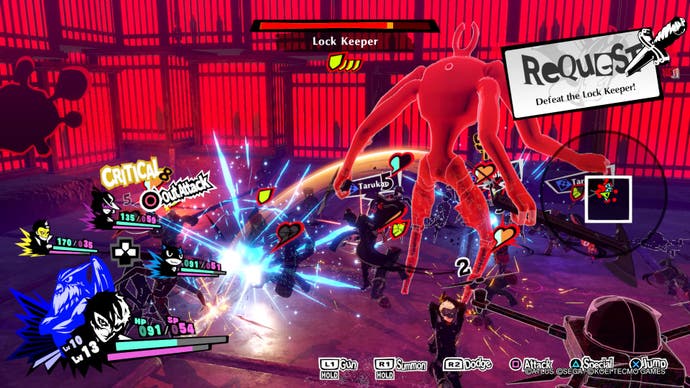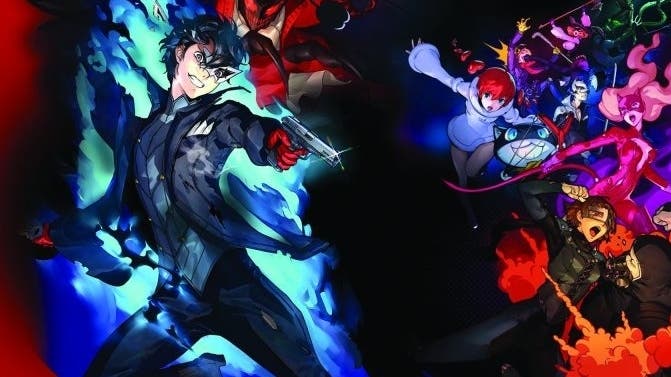Persona 5 Strikers review - an impressive sequel that inherits some of the original's flaws
School's out.
Persona 5 Strikers was born in a fit of consternation. Back when the spin-off was announced, with many fans holding out hope for a Switch port of P-Studio's excellent 2016 JRPG, the news that this would be another of Omega Force's seemingly endless musou reskins was met with a slightly disappointed shrug. It felt like an odd fit - these are games that, to put it mildly, aren't known for their storytelling. Here's the good news: Persona 5 Strikers retains most of the elements you know and love from Persona 5, but with a combat system lifted from another series.
It's also a direct sequel, so despite it releasing on PC and, slightly ironically, on Switch, you'll be lost if you haven't played the PlayStation-exclusive Persona 5 or Persona 5 Royal first. Strikers begins immediately after the events of Persona 5. It's the summer and the Phantom Thieves want to get together for a nice camping holiday. On the way to get equipment, Ryuji and the protagonist come across a promotional event by popular model and fashion designer Alice Hiiragi. She offers to become friends on EMMA, a new Siri-style AI companion, but once the protagonist enters Alice's friendship keyword into the app, it transports him into an alternate dimension that looks like the cognitive world from Persona 5.
Persona 5 Strikers introduces a lot of new terms and concepts, but the idea at the heart is the same - certain individuals become distorted enough to rule over their own, slightly creepy pocket dimension. Without spoiling too much, there's one important difference: the rulers, now called monarchs, have the power to brainwash large amounts of people in the real world. This becomes known as a "change of heart epidemic", and in order to stop it, the Phantom Thieves have to travel across Japan, making Strikers one epic road trip.
Moving away from Tokyo is a bold and brilliant move, and exemplifies something all Japanese media love - travel for the sake of food, rather than sightseeing. It's an obsession of the groups that, at a time when both restaurant visits and travel are impossible, left me seriously wistful. While you learn interesting tidbits about each location, Strikers doesn't really give you anything to do there other than to follow the main plot - you can't meet your friends individually to hang out anymore, and locations are often limited to a parking lot and a shopping mall to buy items at. The new combat system is both entirely different and reassuringly familiar. While Persona 5 was a round-based RPG, you now fight large waves of enemies in hack and slash battles. The enemies are still mostly persona, which means that as before, you fight them by exploiting their elemental weakness using a different persona. The protagonist can collect new persona whenever they drop as masks after battle, and you do a lot more physical fighting, thanks to some severe limitation of your stamina - persona and other spells are really just meant to be used as special attacks. Just as before, you lay into an enemy until it's dizzy, then unleash a devastating all-out attack.
You can also still create new persona and level them up in the Velvet Room, though there are fewer persona than before, and you're expected to level them up and keep them around for longer. Annoyingly, I didn't figure this out until I was almost done with the game, which meant that my very first persona, suddenly needed again to create a higher-level persona, was not sufficiently levelled.

I love how effortlessly each of these elements was integrated into a very different battle mechanic, but the results can be disappointing. Visually, battles have the same stylish appearance as before, but that means you often can't see what you're doing for all the speed lines and flashing colours. Evading attacks, or even knowing when you've been hit is difficult, because the controls feel kind of weightless. Sometimes it's plain impossible to see what's going on, and at those times Strikers very much earns its Japanese name Scramble.
As in Persona 5, purchasable health items do very little compared to magic, and running out of stamina for magic still feels like a punishment. When you run out, you have to leave the dungeon for the real world and then enter it again, which is okay because Persona 5 Strikers no longer has a limited number of in-game days for you to finish a dungeon in. But the difficulty of battles varies wildly, meaning that regular mid-bosses, of which this game has a lot, can absolutely body you, while end bosses barely have enough time to look at you twice.
While combat has its fair share of flaws, it has moments I like very much. The showtime attacks from Persona 5 Royal have been given a makeover and are still unbearably cool to look at, and some levels allow you to rush foes using items such as snowboards or luggage carts. You can take control of each character, and they all feel completely different to play - Makoto's special attack lets you run into a crowd of enemies on her motorbike, and the agile Yusuke flits around with his sword, which feels much lighter than Haru's axe. It's fun to rack up follow-up attacks and switch characters mid-strike with the press of a button.
I've never been a fan of Persona's level design, and Strikers is no different. Levels in the cognitive world are no longer limited to a single building, but encompass several streets of a city. Each still has a theme, but they all amount to little more than long corridors and large rooms. What passes for a puzzle in Strikers is frankly an insult, seeing as the series barely had puzzles before, and levels don't look good, either. Another slight disappointment comes via the soundtrack - there are some great new battle themes and remixes of previous songs, but overall the music ranges from nondescript to grating, which makes me sad.

For all that, though, Persona 5 Strikers works out like its predecessor - not a massive gameplay hit, but with such a gripping story you can easily forgive its flaws. In my opinion most games don't need a sequel, and they need a sequel even less if they take an average 120 hours to complete, but thankfully the developers heard people on that one. Strikers comes in at less than half the length of Persona 5/Persona 5 Royal. It's still a game that feels overly long at times, due to a lack of variety - in dungeons you will perform the same task several times in a row (pressing buttons! Collecting crystals to go into doors!), or characters may do nothing but talk for up to half an hour. Towards the end there is also again a point at which you think the game is over and the credits are basically minutes away, just for Strikers to go "actually, have two more dungeons," a practice that's honestly completely mystifying to me.
But back to what's great about this spin-off, and there is plenty. Persona 5 Strikers is a meaningful evolution of the first game's story, and it's a joy to get reacquainted with the Phantom Thieves. It wasn't just nice to hear them banter, it was good to see that after you've spent the first game discovering and dealing with their trauma, they haven't only found closure, but can use that new understanding of themselves to help others in a meaningful way. I also like how our understanding of the cognitive world evolves. While the first game had proper villains, people who were evil for the sake of gaining power, this time you encounter a group of broken people, people who aren't bad, but who made the wrong decisions and ended up hurting others, which is a much more interesting and complex approach. I don't want to spoil the ending, but I would've loved for Strikers to commit to this idea fully instead of introducing a new idea basically in the last hour, but that's just Persona for you, a series which has consistently been good at the same things it's always been good at, and rarely addressed its shortcomings.

That's why on the good end we have two new main characters - police man Zenkichi Hasegawa, whose role I seriously hope you haven't been spoiled for by P5S's own marketing materials(!) and Sophia, an AI in the shape of the cutest girl imaginable, as well as a story that muses on the nature of justice, humanity's ability to learn from its mistakes, even the amount of influence tech bros wield over modern society. On the other side: misogyny for laughs, fat shaming, and gay baiting. One bewildering scene where the girls loudly demand of the protagonist to pick one of them for a date. If you're already typing "that's normal for Japanese games!", settle down - I know. But as Persona 5 Strikers says itself, we all have the ability to change, and I'm just going to go ahead and optimistically include this series in that statement.
There's a whole lot of good here that easily balances out the bad if you're already a fan of Persona 5, and I'm pretty sure that if P-Studio made approximately 5 more sequels we would eventually arrive at the perfect version of Persona 5. There's just always so much of everything, from plot strands to enemies to fight and food to eat, that I had a great time while simultaneously feeling pretty exhausted by it all. Though that's just videogames for you.










